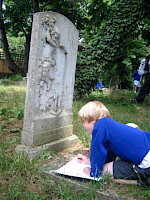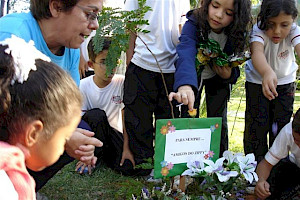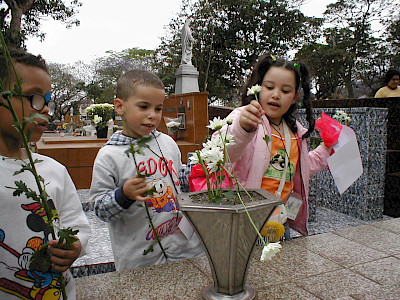Talking to Children about Death

Many adults avoid talking to children about death and dying because they think it will make them sad or anxious. In fact, talking openly about death helps children to deal with the idea and makes them less worried about it. This is true even for young children.
Partnership for Children’s programmes - Zippy's Friends, Apple's Friends and Passport each devote at least one session to talking about death and dying, and teachers often say that these are some of the most popular and useful sessions, even for five and six year-olds. Skills for Life teachers have found that children can talk openly with each other about this topic, and can ask and answer very direct questions without feeling uncomfortable.
When family members or friends die, it’s important to be honest with children about what has happened. Encourage them to ask questions and talk about the person who has died. If adults are overwhelmed by their own grief, they may find it hard to listen to their children. But it’s important for children to be able to talk about their feelings and worries with a parent or another trusted adult. This is particularly true if a person has died by suicide. A child whose parent or sibling has died may feel angry or guilty, and bottling up these feelings may cause problems years later. Even if a child becomes very emotional, they will appreciate being able to talk openly.
Start where the where the child is, by asking, ‘What do you think happens when someone dies?’ Don’t bombard them with lots of information. Just listen carefully, correct false ideas which are worrying them, and give clear, honest information.
Watch our video on talking to children about death:
What the research says
Children typically develop great curiosity about death as soon as they come across make-believe deaths in fairy tales, games and on television. Children pretend to be dead in games, they kill ‘bad guys’ in video games and often discuss death freely with other children. Children usually talk as easily about death and dying as they discuss sports, favourite toys or foods they like. When someone they love dies, they are saddened by the death, but may still be very curious and ask a lot of questions about the dead person and death itself. However, if an adult is uneasy discussing death, children will pick this up and will keep quiet, either because they don’t want to upset the adult, or because they sense that the topic is off-limits.
Although children have some understanding of death at a very early age, the way in which they understand it is often very different from ‘mature’ adult understandings of why people die and what then happens. The first studies of children’s conceptions of death were undertaken during and after the Second World War, when many children lost a parent. Researchers began to interview children systematically and ask them what they thought happens when a person dies. They found that very young children understand death as being a sleep-like state from which one can be awakened, as in the fairy tale Sleeping Beauty. For the youngest children, it is possible to avoid death by being clever or careful, or having a good doctor. Death is not necessarily permanent. People can die and come back to life, just like the cartoon characters who are crushed by a truck and then miraculously go on as if nothing happened. According to under-fives, people die because they take risks or are unlucky. Children of this age don’t usually realise that all humans must die or that death can be caused by illness. Dead people may be able to have thoughts and feelings and may be able to see and hear. However, their abilities may be limited – for example, they may not be able to move or see very much because they are stuck in a dark coffin.

Research on what children think about death has often focused on stages of development, and researchers agree that children’s understanding of death develops gradually and changes over time. Researchers often focus on when children acquire particular sub-concepts of the understanding of death. Finality, the sense that a dead person cannot come back to life, is one of the first sub-concepts which children develop. Universality, the fact that everyone must and will die some day, is usually understood by age six to eight. However other sub-concepts, such as unpredictability - the notion that one can die at any time - and inevitability – that, regardless of what we do to escape death, we can still die - may not come until much later.
When children are asked, ‘What happens when you die?’, they don’t usually say that death is a final state without thoughts and feelings. Some children repeat what they learn from parents or religious teaching, saying, for example, ‘You go to Heaven’, but this can be because they think that’s what adults expect them to say. Usually, if children are asked other questions, they readily admit that they think other things as well.
There is another characteristic of children’s understanding of death which is important to bear in mind. Children are capable of believing several completely contradictory things at the same time. Adults are often amazed by this. For an adult, if you believe that death is final, you can’t also believe that if you have a good doctor or if you pray long enough a dead person can come back to life. It’s not unusual for a young child to describe exactly how the dead cannot see, hear or talk to living people, and then, a few minutes later, explains how her dead grandfather sees everything and is looking forward to seeing her win a race at sports day. For this reason, people who talk about death with children may get frustrated because they think children are lying or saying anything that comes into their head. This is usually not the case. Children simply have a wonderful ability to believe several incompatible things at the same time.
It is useful for children to talk about death so that they can test whether their understanding of death is similar to what other children and adults think, and express feelings they may have kept inside about the death of a loved one. Children are rarely given this opportunity because most adults are hesitant to discuss death with them.

Children may have beliefs which, if not clarified, cause them needless problems. A child whose parent has died often feels guilty. No child is perfect, and children sometimes believe that because they did something wrong, their father or mother died. It’s important to reassure them that it’s not their fault. They may feel angry, but learn very quickly that it’s not acceptable to express anger towards the dead person – it’s all right to be sad, but it’s not all right to be angry at a parent for having abandoned you. In discussing death with children, it is important to help them view their feelings as normal by saying things like, ‘It’s normal to feel angry when someone you love has died, because it feels like they abandoned you. But they couldn’t help it. I’m sure they would have stayed alive if they could.”
Usually discussions of death with children do not need much input from a parent or teacher. Children have a lot to say about the topic and are quick to react when another child expresses an unusual or immature belief. Children are generally comforted by realising that this sometimes taboo topic is really not as mysterious or frightening as some adults would lead them to believe.
This article is based on the research and advice of Prof Brian L Mishara, PhD, Professor, Psychology Department, Director, Centre for Research and Intervention on Suicide Ethical Issues and End-of-Life Practices (CRISE), University of Quebec at Montreal